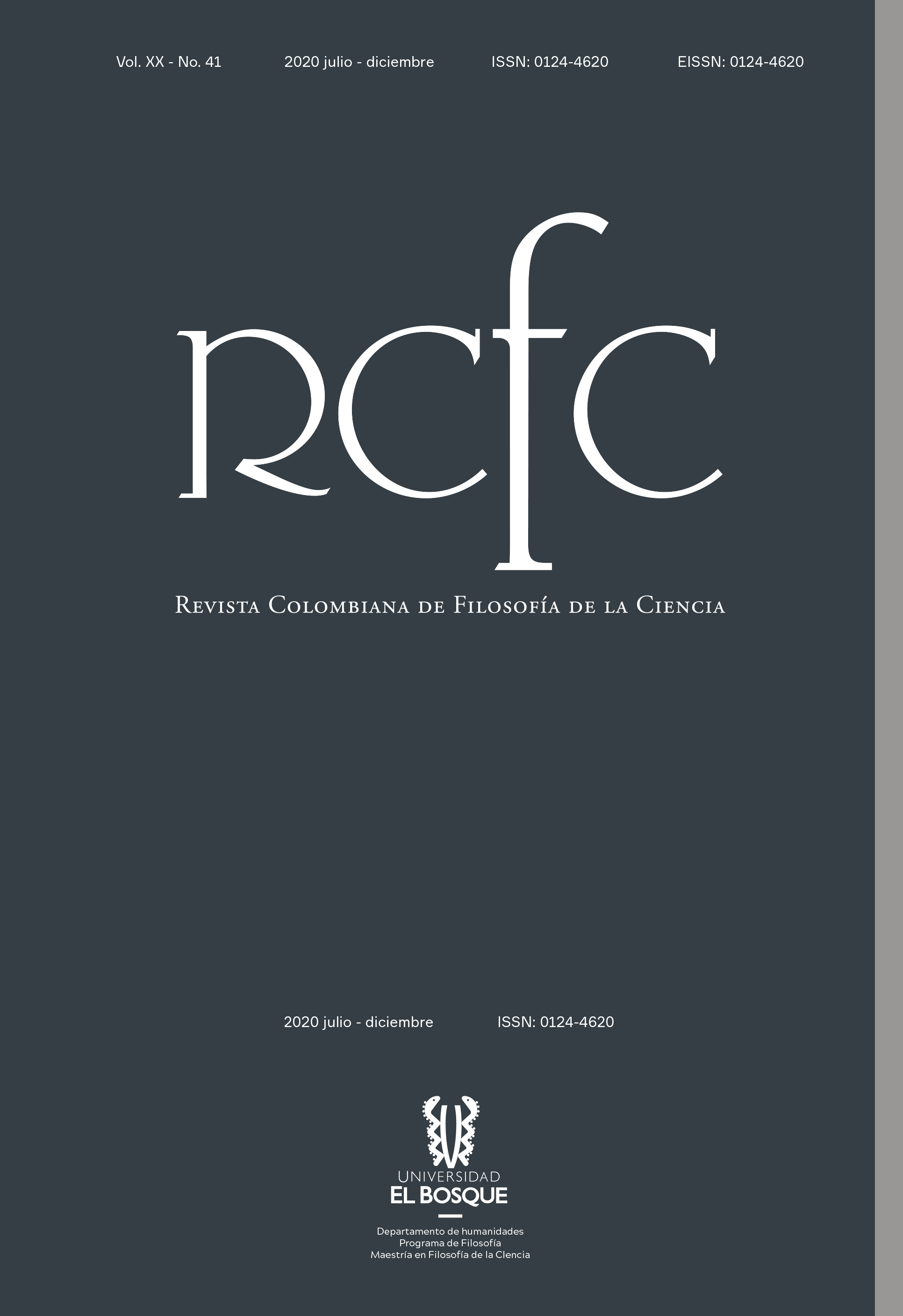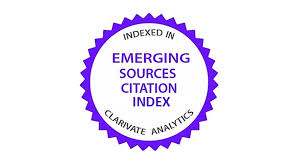Filosofía de la Ciencia del Cambio Climático
modelos, problemas e incertidumbres
DOI:
https://doi.org/10.18270/rcfc.v20i41.3193Palabras clave:
calentamiento global, detección, atribución, modelos climáticos, incertidumbres, epistemología, realismo científicoResumen
El objetivo de este artículo es mostrar los problemas de la filosofía de la ciencia que enfrentan los investigadores del cambio climático. El tópico de la carga teórica de la observación aparece dentro del campo como una indispensabilidad de modelos teóricos en la detección y atribución del cambio climático. La infra-determinación empírica de los modelos se acompaña de una incertidumbre de valores (de series instrumentales y datos proxy) y una incertidumbre estructural, relativa a la especificación de los acoplamientos y forzamientos radiativos. Se examina, además, el realismo de los modelos globales en conexión con su calibración y las proyecciones climáticas.
Descargas
Referencias bibliográficas
Álvarez Muñoz, Evaristo. Filosofía de las ciencias de la tierra. Oviedo: Pentalfa, 2004.
Brohan, Philip et ál. “Uncertainty Estimates in Regional and Global Observed Temperature Changes: A New Data Set from 1850”. Journal of Geophysical Research 111 (2006): D12106. <https://doi.org/10.1029/2005JD006548>
Bueno, Gustavo. “En torno a la doctrina filosófica de la causalidad”. Revista Meta 1 (1992a): 207-227.
____. Teoría del cierre categorial. Oviedo: Pentalfa, 1992b.
Callendar, Guy S. “The Artificial Production of Carbon Dioxide and Its Influence on Temperature”. Journal of the Royal Meteorological Society 64.275 (1938): 223-240. <https://doi.org/10.1002/qj.49706427503>
Cartwright, Nancy. How the Laws of Physics Lie. Oxford: Clarendon Press, 1983.
____. The Dappled World. Cambridge: Cambridge UP, 1999.
Curry, Judith A. y Peter J. Webster. “Climate Science and the Uncertainty Monster”. Bulletin of the American Meteorological Society 92.12 (2011): 1667-1682. <https://doi.org/10.1175/2011BAMS3139.1>
Edwards, Paul N. A Vast Machine. Computer Models, Climate Data, and the Politics of Global Warming. Massachusetts: MIT Press, 2010.
Essex, Cristopher et ál. “Does a Global Temperature Exist?” Journal of Non-Equilibrium Thermodynamics 32.1 (2007): 1-27. <https://doi.org/10.1515/JNETDY.2007.001>
Fleming, James R. “Joseph Fourier, the ‘Greenhouse Effect’, and the Quest for a Universal Theory of Terrestrial Temperatures”. Endeavour 23.2 (1999): 72-75. <https://doi.org/10.1016/S0160-9327(99)01210-7>
Frank, David et ál. “A Noodle, Hockey Stick, and Spaghetti Plate: a Perspective on High-Resolution Paleoclimatology: A Noodle, Hockey Stick, and Spaghetti Plate”. WIREs Climate Change 1.4 (2010): 507-516. <https://doi.org/10.1002/wcc.53>
Frigg, Roman, Seamus Bradley, Hailiang Du y Leonard Smith. “Laplace’s Demon and the Adventures of His Apprentices”. Philosophy of Science 81.1 (2014): 31-59. <https://doi.org/10.1086/674416>
Frigg, Roman, Richard Bradley, Katie Steele, Erica Thompson y Charlotte Werndl. “The Philosophy of Climate Science”. Internet Encyclopedia of Philosophy, 2020. <https://iep.utm.edu/climate/>
Gettelman, Andrew y Richard B. Rood. Demystifying Climate Models. A Users Guide to Earth System Models. Switzerland: Springer, 2016.
Hacking, Ian. “The Self-Vindication of the Laboratory Sciences”. Science as Practice and Culture. Ed. A. Pickering. Chicago: Chicago UP, 1992. 29-64.
Hourdin, Frédéric et ál. The Art and Science of Climate Model Tuning. Bulletin of the American Meteorological Society (2017): 589-602. <https://doi.org/10.1175/BAMS-D-15-00135.1>
Intergovernmental Panel on Climate Change [IPCC]. Climate Change 2013: The Physical Science Basis. Contribution of Working Group I to the Fifth Assessment Report of the Intergovernmental Panel on Climate Change. Cambridge: Cambridge UP, 2013a.
_____. Resumen para responsables de políticas. Resumen técnico. Cambridge: Cambridge UP, 2013b.
Kalnay, Eugenia y Ming Cai. “Impact of Urbanization and Land-Use Change on Climate”. Nature 423 (2003): 528-531. <10.1038/nature01675>
Katzav, Joel. “Hybrid Models, Climate Models, and Inference to the Best Explanation”. The British Journal for the Philosophy of Science 64.1 (2013): 107-129. <https://doi.org/10.1093/bjps/axs002>
Knutti, Reto. “Should We Believe Model Predictions of Future Climate Change?” Philosophical Transactions of the Royal Society A: Mathematical, Physical and Engineering Sciences 366.1885 (2008): 4647-4664. <https://doi.org/10.1098/rsta.2008.0169>
____. “The End of Model Democracy?” Climatic Change 102 (2010): 395-404. <https://doi.org/10.1007/s10584-010-9800-2>
Lenhard, Johannes y Eric Winsberg. “Holism, Entrenchment, and the Future of Climate Model Pluralism”. Studies in History and Philosophy of Modern Physics 41.3 (2010): 253-262. <https://doi.org/10.1016/j.shpsb.2010.07.001>
Lloyd, Elisabeth. “Varieties of Support and Confirmation of Climate Models”. Proceedings of the Aristotelian Society, Supplementary Volumes 83 (2009): 213-232. <https://www.jstor.org/stable/20619136>
Madrid Casado, Carlos M. La mariposa y el tornado. Teoría del caos y cambio climático. Barcelona: RBA, 2011.
Mann, Michael E. et ál. “Global-Scale Temperature Patterns and Climate Forcing Over the Past Six Centuries”. Nature 392.6678 (1998): 779-787. <https://doi.org/10.1038/33859>
Marcott, Shaun A. et ál. “A Reconstruction of Regional and Global Temperature for the Past 11,300 Years”. Science 339.6124 (2013): 1198-1201. <10.1126/science.1228026>
McIntyre, Stephen y Ross McKitrick. “Corrections to the Mann et al. (1998) Proxy Data Base and Northern Hemispheric Average Temperature Series”. Energy & Environment 14.6 (2003): 751-771. <https://doi.org/10.1260/095830503322793632>
Morton, Timothy. Hyperobjects: Philosophy and Ecology after the End of the World. Minnesota: Minnesota UP, 2013.
Nabergall, Lukas, Alejandro Navas y Eric Winsberg. “An Antidote for Hawkmoths: on the Prevalence of Structural Chaos in Non-Linear Modeling”. European Journal for Philosophy of Science 9.2 (2019): 1-28. <https://doi.org/10.1007/s13194-018-0244-2>
Norton, Stephen. y Frederick, Suppe. “Why Atmospheric Modeling is Good Science”. Changing the Atmosphere: Expert Knowledge and Environmental Governance. Eds. Clark Miller y Paul Edwards. Cambridge: MIT Press, 2001. 88-133. <https://doi.org/10.7551/mitpress/1789.003.0006>
Oreskes, Naomi et ál. “Verification, Validation, and Confirmation of Numerical Models in Earth Sciences”. Science 263.5147 (1994): 641-646. <10.1126/science.263.5147.641>
Palmer, Tim. “Global Warming in a Nonlinear Climate - Can We Be Sure?” Europhysics News 36.2 (2005): 42-46. <https://doi.org/10.1051/epn:2005202>
Parker, Wendy S. “Climate Science”. The Stanford Encyclopedia of Philosophy. Ed. Edward N. Zalta. 2018. <https://plato.stanford.edu/archives/sum2018/entries/climate-science/>
Petersen, Arthur C. Simulating Nature: A Philosophical Study of Computer-Simulation Uncertainties and Their Role in Climate Science and Policy Advice. Florida: CRC Press, 2012.
Pickering, Andrew. The Mangle of Practice: Time, Agency and Science. Chicago: Chicago UP, 1995.
Podgorny, Irina. “La Tierra en el laboratorio: las ciencias de la Tierra en el siglo XX”. Filosofía de las ciencias naturales, sociales y matemáticas. Ed. Ana Estany. Madrid: Trotta, 2005. 129-162.
Randall, David A. y Bruce A. Wielicki. “Measurements, Models, and Hypotheses in the Atmospheric Sciences”. Bulletin of the American Meteorological Society 78.1 (1997): 399-406. <https://doi.org/10.1175/1520-0477(1997)078<0399:MMOHIT>2.0.CO;2>
Rohde, Robert et ál. “A New Estimate of the Average Earth Surface Land Temperature Spanning 1753 to 2011”. Geoinformatics & Geostatistics: an Overview 1.1 (2013): 1. <10.4172/2327-4581.1000101>
Santos Burguete, Carlos, Ed. Física del caos en la predicción meteorológica. Madrid: AEMET, 2018.
Schmidt, Gavin. “NASA Climatologist Gavin Schmidt Discusses the Surface Temperature Record”. NASA, 2010. <https://www.nasa.gov/topics/earth/features/gavin-schmidt.html>
Schmidt, Gavin A. y Steven Sherwood. “A Practical Philosophy of Complex Climate Modeling”. European Journal Philosophy of Science 5.1 (2015): 149-169. <https://doi.org/10.1007/s13194-014-0102-9>
Solanki, Sami Khan y Natalie Krivova. “Can Solar Variability Explain Global Warming Since 1970?” Journal of Geophysical Research 108.5 (2003): 71-78. <10.1029/2002JA009753>
Storch, Hans von et ál. “Reconstructing Past Climate from Noisy Data”. Science 306 (2004): 679-682.
Stott, Lowell D. et ál. “Deep Sea Temperatures Warmed before Atmospheric CO2 and Tropical Temperatures Began to Rise at the Last Glacial Termination”. Science 318 (2007): 435.
Thompson, Erica. Modelling North Atlantic Storms in a Changing Climate. PhD diss. Imperial College, 2013.
Werndl, Charlotte. “On Defining Climate and Climate Change”. The British Journal for the Philosophy of Science 67.2 (2016): 337-364. <10.1093/bjps/axu048>
Winsberg, Eric. Philosophy and Climate Science. Cambridge: Cambridge UP, 2018.
____. “Computer Simulations in Science”. The Stanford Encyclopedia of Philosophy. Ed. Edward N. Zalta. 2019. <https://plato.stanford.edu/archives/win2019/entries/simulations-science/>
World Meteorological Organization [WMO]. Guide to Climatological Practices. Genova: WMO, 2011.

Descargas
Publicado
Cómo citar
Número
Sección
Licencia

Esta obra está bajo una licencia internacional Creative Commons Atribución-NoComercial-SinDerivadas 4.0.

| Estadísticas de artículo | |
|---|---|
| Vistas de resúmenes | |
| Vistas de PDF | |
| Descargas de PDF | |
| Vistas de HTML | |
| Otras vistas | |










